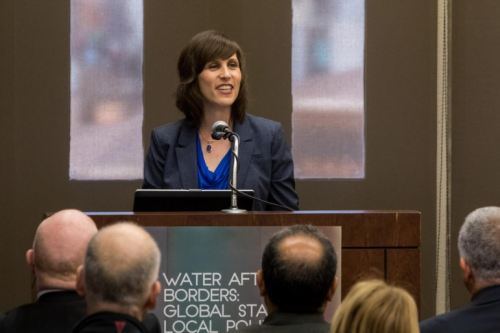
BY ERICA WILLIAMS
Spear-headed by Dr. Rachel Havrelock, the Freshwater Lab is the first initiative focused on the Great Lakes in humanities at the University of Illinois at Chicago. The project works relentlessly to create open dialogue that addresses the water issues of the Great Lakes while bringing passionate communities together for the betterment of their water sources.

Dr. Havrelock advocating for clean water. Photo courtesy of Great Lakes Echo.
The origin of the Freshwater Lab traces back to Good Water Neighbors, part of the Ecopeace initiative, which joins communities that share watersheds. Through this project, mayors and community leaders alike come together to protect the water, help locals to have a say in what happens to their water, and unites communities to fight for inequality. Like its parent project, the Freshwater Lab follows suit with its commitment to the improvement of the community and its desire to ensure that every participant’s voice is heard.
An example of this is the oil pipeline project, in which activists and leaders banded together to think of some ways that they could go about demolishing Enbridge Line 5’s 60-year-old pipeline in Western Canada, which was becoming a threat to drinking water because it flows under the Straits of Mackinac, coupling Lake Michigan and Lake Huron. With its major supporters and hands-on style of research, the Freshwater Lab compels students, leaders, organizations, and people who work on the Great Lakes at a bi-national level, not only to get involved but to align what they have already accomplished with the mission of the initiative and the needs of the communities. Communities link themselves together so that those who are not receiving the proper living accommodations have a platform to address water concerns and the specific necessities of their neighborhoods.

The Chicago coast of Lake Michigan.
According to Dr. Havrelock, in order to see progress, people must coalesce around the water, connect with others, and give them the opportunity to express how much the water means to them. She also says that if one wishes to contribute to the advancement of the lakes, start by not drinking bottled water because it is often pulled from the lakes without permission. She also advises to use non-toxic soap when doing laundry. From speaking with Dr. Havrelock, I learned to cherish the natural resource of the Great Lakes and realized how much work it will take to preserve it, along with a reinforcement of the idea that anything worth having is worth fighting for.






